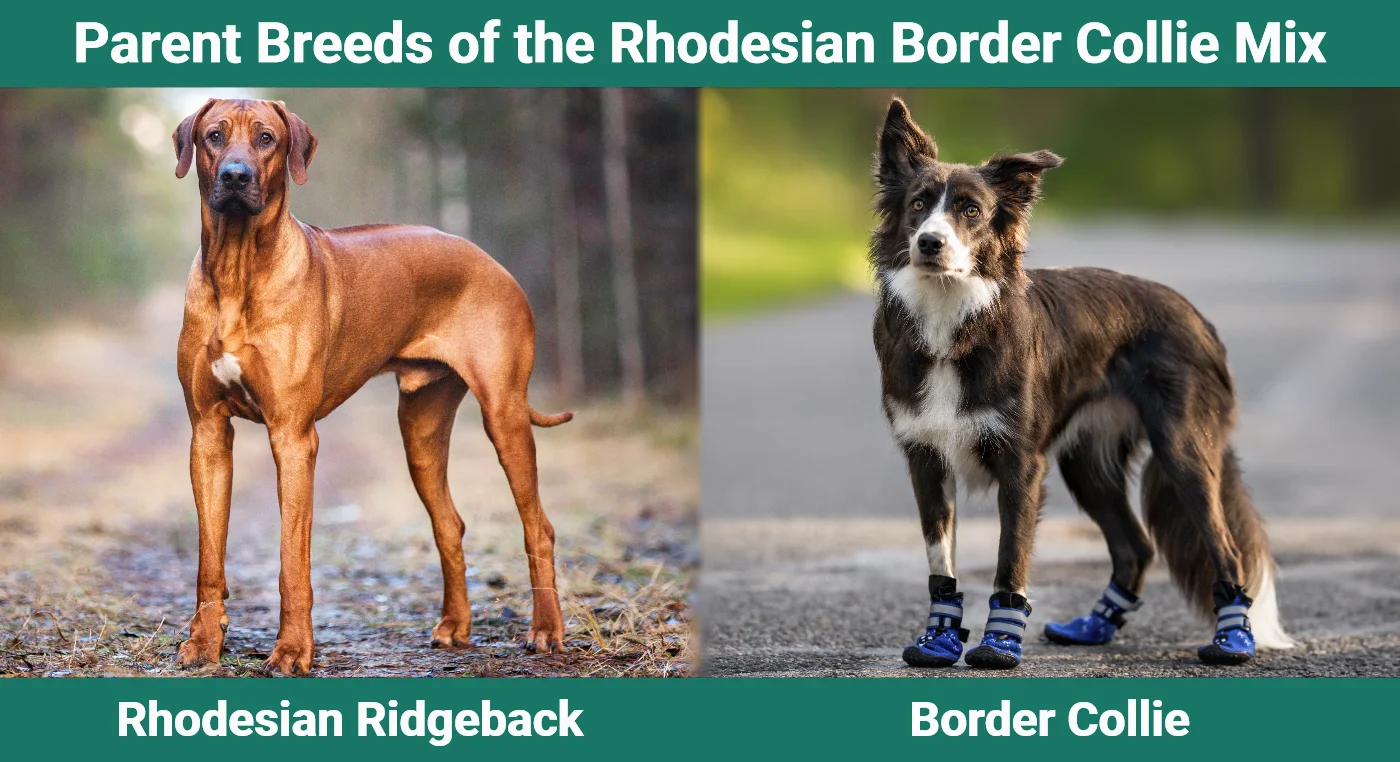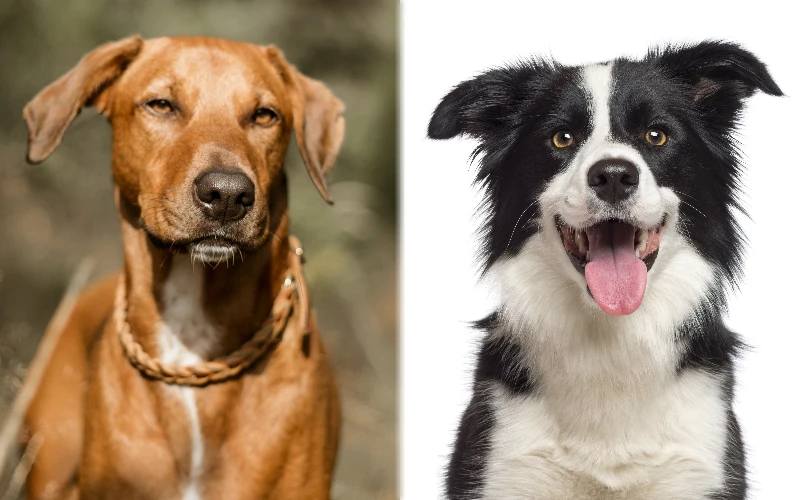Click Below to Skip Ahead
The Rhodesian Ridgeback was once a feared lion-hunting dog that never killed their prey, even though they were strong enough to do so. The Border Collie is an athletic, agile, and energetic dog that’s most content when they have a job to do. When you combine the breeds, a Rhodesian Border Collie can be an athletic, intelligent, and affectionate companion. Does that sound like your kind of hound? Then read on to learn more about this hybrid canine.
Breed Overview
Height:
18–27 inches
Weight:
30–70 pounds
Lifespan:
10–15 years
Colors:
A wide variety
Suitable for:
Experienced owners, families with older children
Temperament:
Cunning, curious, affectionate, independent, protective
You’re bound to get interesting results when you combine a fierce but affectionate Rhodesian Ridgeback with a super-energetic and highly trainable Border Collie. A big dog with a big personality is likely when you adopt a Rhodesian Border Collie, one that needs a firm but loving hand to become a well-behaved and friendly companion and family pet. Socialization and training will be critical during their formative 1 to 2 years as a puppy. Learning and sharing an activity together is also highly recommended since your new dog will need a lot of activity to stay healthy and happy.
Rhodesian Border Collie Mix Puppies
Finding a Rhodesian Border Collie mix will probably not be easy unless you live in or near a major city. There aren’t that many breeders who are breeding Rhodesian Border Collies. It’s a niche segment of the dog community.
One suggestion is to contact all the shelters and animal rescue organizations near your home and ask them to let you know if a Rhodesian Border Collie shows up at their facility. Volunteering to help is always a great way to ingratiate yourself with the staff. Keep in mind that, as a rescue or shelter dog, determining your Rhodesian Border Collie’s background will be difficult, if not impossible.
If you get lucky and find a breeder or shelter with Rhodesian Border Collie puppies, you should remember a few things before you choose one. They include the following:
- They should be active and curious.
- They should have no mucous around their eyes, ears, nose, and muzzle. This could indicate a sick puppy.
- The puppy should come to you on their own
- They should be playful but not too aggressive

Temperament & Intelligence of the Rhodesian Border Collie Mix
When adopting a mixed-breed dog like the Rhodesian Border Collie, it’s difficult to determine the personality they will eventually have as an adult. However, looking at the parents can be helpful and give you a better idea.
The Border Collie is eager-to-please, whip-smart, and one of the easiest breeds to train. They also demand a lot of attention and need to be busy all the time, or they can become distraught and destructive. Border Collies raised well will be attentive, sweet, and great with kids and will definitely keep you active.
The Rhodesian Ridgeback is a prey-seeking expert who will run after about anything that moves. It’s not aggressive, per se, but demands proper socialization to keep their instincts from overwhelming their senses. When raised correctly, adult Rhodesians are gentle, affectionate, and, although huge, love being lapdogs.
Your Rhodesian Border Collie will likely be affectionate with your family but slightly standoffish with strangers. With proper socialization, Rhodesian Border Collies should get along well with other dogs and cats, but raising them together is highly recommended for the best outcome.
Are These Dogs Good for Families? 👪
Almost any dog will be good for a family if they are prepared for the type of dog they adopt and provide for all of its unique needs. A Rhodesian Border Collie is an excellent match for a younger couple with no children because they can spend more time with them.
As for families with kids, it’s recommended that the children be older and mature enough to know how to engage with and handle a dog. A Rhodesian Border Collie will be a medium to large dog and, although not aggressive, might knock a smaller child off their feet accidentally.
The Rhodesian Border Collie might not be a great choice for seniors since most are active and large dogs.
Does This Breed Get Along With Other Pets? 🐶 😽
Neither the Rhodesian Ridgeback nor the Border Collie are known to be friendly with other dogs. That means your Rhodesian Border Collie might not be a candidate to take to the local dog park.
Like almost all dogs, if raised from a puppy with other dogs or puppies, the chance your Rhodesian Border Collie will get along with them is much higher. The same can be said for cats and other pets, but the smaller they get, the higher the chance your pup’s prey drive kicks into high gear.
Socialization is the key to keeping the peace between pets. It’s also why bringing a Rhodesian Border Collie adult into your home if you already have other dogs and pets could be problematic. That’s especially true with males, who tend to be more aggressive towards other males.
In other words, if you want the best chance of your Rhodesian Border Collie getting along well with your other pets, adopting and raising a puppy with your pets will give you the best chance of a positive, peaceful, and harmonious outcome.
Things to Know When Owning a Rhodesian Border Collie Mix:
Food & Diet Requirements
The average Rhodesian Border Collie is an active dog that needs a diet high in protein and healthy fats and low in carbohydrates. As with all breeds, Rhodesian Border Collie puppies will require more protein in their kibble for proper growth and the health of their still-forming bones, joints, muscles, and organs. Once your puppy becomes an adult, their protein and fat needs will drop. At this point, buying dog food formulated for large adult dogs will be necessary to ensure they stay healthy and fit.
Lastly, a dog the size of a Rhodesian Border Collie must consume about 20 calories per pound per day of food. For a 50-pound dog (the average size of a Rhodesian Border Collie), that’s 1,000 calories daily. However, these numbers might change based on your dog’s adult weight.
Exercise
One thing that’s almost certain when you adopt a Rhodesian Border Collie is that you’ll be kept very busy with your pet, both as a puppy and an adult dog. Their parents are active, and the Border Collie is far above the average. You’ll need to provide 2+ hours of strenuous daily activity, whether walking, running, playing fetch, or other dog-centric activities.
A high level of exercise isn’t just necessary for a Rhodesian Border Collie to stay healthy but also to prevent them from becoming bored and destructive. Border Collies become destructive when they aren’t given the attention they demand, and Rhodesian Ridgebacks aren’t far behind.
One last important factor to remember is to not over-exercise a Rhodesian Border Collie puppy. The reason is that Rhodesians are large dogs with a tendency to have hip and elbow dysplasia. Too much running, jumping, and other strenuous activity can affect the growth plates in your Rhodesian Border Collie’s knees and might cause early-onset hip and elbow dysplasia.
Training
One popular opinion about Border Collies is that they “train themselves” because they’re so eager to learn and want something to do at all times. They’re also people-pleasers and highly intelligent. Rhodesian Ridgebacks, however, can be a bit stubborn and willful, so your Rhodesian Border Collie will probably have some combination of those attributes.
If you’re lucky, you’ll end up with a dog that’s easy to train and can quickly learn new commands. However, positive reinforcement training is recommended regardless of your dog’s temperament. The parents of the Rhodesian Border Collie are sensitive animals that don’t do well with negativity, yelling, and harsh punishments.
Grooming ✂️
The amount of grooming your Rhodesian Border Collie will need depends on whether they favor their Rhodesian or Border Collie bloodlines. Rhodesian-like fur will need to be brushed once a week, but a dog with Border Collie hair must be brushed two to three times weekly.
Your Rhodesian Border Collie might also have big claws that need trimming every 5 to 6 weeks, but no matter which breed they take after, clipping their nails regularly is essential. Brushing your Rhodesian Border Collies teeth is also a must, which veterinarians suggest you start doing when they’re a puppy. Trying to brush a full-grown Rhodesian Border Collie’s teeth for the first time will be difficult.
Health and Conditions
Both the parents of the Rhodesian Border Collie are healthy dogs, but you should note that the Border Collie lives about 25% longer than the Rhodesian Ridgeback. Bigger dogs, unfortunately, have statistically shorter lives.
Hip and elbow dysplasia are a distinct possibility for a Rhodesian Border Collie, but yours might be on the small side and thus have less of a risk. Border Collies also have a higher rate of deafness and epilepsy, and a congenital dermoid sinus is possible with Rhodesian Ridgebacks.
- Collie eye anomaly
- Congenital dermoid sinus
- Allergies
- Hip and elbow dysplasia
- Thyroid issues
- Progressive Renal Atrophy (PRA)
- Deafness
Male vs Female
Male Rhodesian Border Collies are about 20% larger than females and more aggressive, especially if left sexually intact. Veterinarians recommend spaying and neutering your Rhodesian Border Collie unless breeding them is in your plans.
Desexing your pet has several benefits. First, it will statistically extend your pet’s life by about 20%. Also, especially for males, their aggressive tendencies will be less pronounced, especially when around other males.
Lastly, by spaying and neutering your Rhodesian Border Collie, you’re helping prevent overbreeding and an overabundance of stray dogs that end up in shelters and rescues.
3 Little-Known Facts About the Rhodesian Border Collie Mix
1. The Rhodesian Ridgeback and Border Collie Have a Double Coat of Straight Fur.
Your Rhodesian Border Collie mix will likely have the same.
2. Your Rhodesian Border Collie Might Bark a Little or a Lot.
It depends on which traits they inherit. The Border Collie barks and howls constantly, while the Rhodesian Ridgeback barks infrequently.
3. Most Rhodesian Border Collies Are Adaptable to any Living Situation.
As long as they get their exercise, an apartment, a house with a large yard, or anything in between will be just fine as a living space.
Final Thoughts
You’re bound to get fascinating results when you breed two dogs with distinct differences. The Rhodesian Border Collie is one of the combinations that will be different every time, with some leaning harder towards one breed than the other.
Anecdotal evidence shows that Rhodesian Border Collies are affectionate, intelligent, and doting dogs that make great companion pets when well-trained, raised by responsible pet parents, and socialized from an early age.
Of course, that can be said for almost any breed, but with two dogs that share a high prey drive, raising them well will be a genuine necessity. If you can do that, the chance you’ll end up with a well-behaved and socially intelligent Rhodesian Border Collie will be much higher.
See Also:
- Rhodesian Staffordshire Terrier Mix: Pictures, Care Guide, Temperament, & Traits
- Border Newfie (Newfoundland Dog Border Collie Mix): Care, Pictures, Info & More
Featured Image Credit: Left – Nina Quka, Pexels | Right – Eric Isselee, Shutterstock










